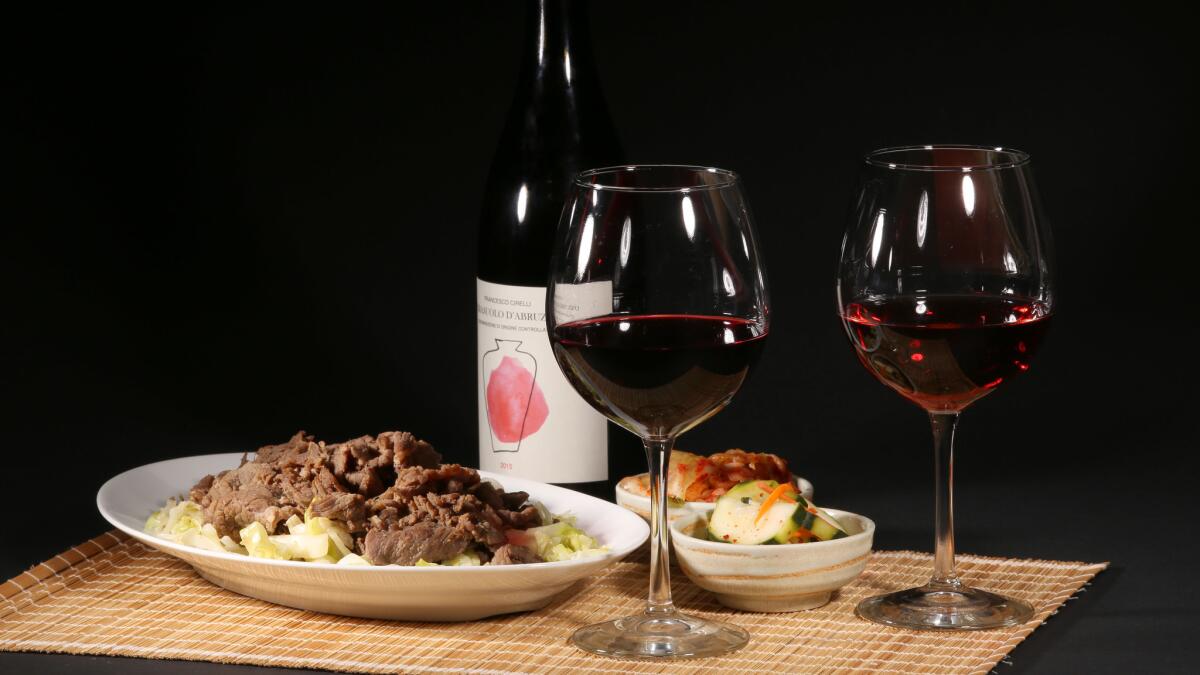Six wines to try with the Korean barbecue dish bulgogi

Sizzling, savory and irresistible, bulgogi is usually steak — the word’s literal translation is “fire meat”— sliced into ribbons, often marinated in soy, sugar, black pepper, garlic and sesame oil, then seared to a charry succulence on a griddle. Along with galbi and bibimbap, it’s surely the most popular dish in L.A.’s many Korean restaurants, including fine bulgogi purveyors such as Park’s, Soot Bull Jeep or Gwang Yang.
When not grilled table-side, few dishes are more theatrical. It’s rushed from the kitchen on a red-hot griddle, sizzling, spitting, steaming on its tiny cast iron altar like an offering, leaving an umami vapor trail between tables — often as not, it is a dish you wear home, on your clothes. For several minutes, it’s too hot to eat, a state of limbo that only heightens the expectation for the first bite.
Most diners, either at Korean restaurants or at home — bulgogi is easily ordered as take-out or made in your own kitchen — wash down that first bite with often lackluster lagers such as Hite or OB. There’s soju, which in terms of food-pairing is like throwing gasoline on a brazier. Wine is almost certainly a better alternative. But which bottles?
See the most-read stories in Life & Style this hour >>
Pairings with bulgogi come with a couple of hurdles. The first is that it can often be sweet, with sugar added to the marinade to offset the peppery heat. So this is an instance when the red-meat-with-red-wine dictum can be comfortably overturned, since several white wines would serve as a good foil.
These can be wines with a touch of sweetness in their own right. The right dry Riesling, from Alsace, from the Rheingau, from Washington State, will pair well, as would a not-so-dry Pinot Gris from Alsace or Oregon. Chenin Blanc, from the Loire Valley regions of Anjou, Montlouis and Vouvray, will also have the acid and the mineral resolve to go up against this fire meat. Certain orange wines will also have the stuffing, as would a sturdier variety of rosé from Bandol, say, or maybe a dark Cerasuolo from the central Italian region of Abruzzo.
As for reds, the heat-and-sweet dictates of bulgogi eliminate anything excessively tannic, full-bodied or oaky. Instead, you want a red wine that’s high in acid, low in tannin, firm but not astringent or drying on the palate, light but not exactly delicate.
Those strictures should point you to Barbera from the Piemonte, a Mencia from the Ribeira Sacra in Spain, or toothy Continental reds from Austria, Hungary, Slovenia and Croatia. These are wines you may not be familiar with — made with varieties like Plavac, Blaufränkisch, St. Laurent and Teran — but these are places whose cool climates largely prevent them from making tannic monsters. Instead, they’re known for reds with dark berry flavors and firm, high-acid detail — and they won’t clash with the bulgogi.
And let’s not leave out Lambrusco — the sparkling red wine from northern Italy justly renowned for its spectacular conjugality with challenging meat dishes. The wine is earthy and a bit funky when first poured, and most Lambruscos possess an inherent fruitiness that will mollify the heat and not get puckery. There’s an ever-growing number of very good dry Lambruscos on the market (mostly gone are the days of the sweet, cloying iterations), and they’ll make you very happy alongside a sizzling plate of barbecue.
Here are six wines to uncork when you want to drink something other than beer or barley tea with your Korean barbecue. Call any restaurant before you bring in bottles of your own —or order your bulgogi to go.
2014 Eroica Columbia Valley Riesling
Zippy and lean, with a lemony scent and flavors more given to apple, Eroica has enough give and breadth to offset both the sweet and the heat in food. About $18 at Wally’s, Mission Wines and Woodland Hills Wine Co.
2014 Cirelli Cerasuolo d’Abruzzo Rosato
“Cerasuolo,” roughly translated, means “like a cherry,” and this wine’s color resembles a pint of Montmorency cherries, with robust raspberry tones and a gripping firmness of texture. About $17 at Lou Wine Shop.
2014 Vietti Barbera d’Asti Tre Vigne
A lean strawberry scent and soft peppery accents meld with plum and red fruit flavors in Vietti’s flagship Barbera; it’s a textbook high-acid red for braised meats. About $18 at Manhattan Fine Wines and Hi-Time Wine Cellars.
2011 Terzolo Istria Teran
An indigo grape of Croatia with a scent that reminds you slightly of consommé, Teran’s dark plum flavors turn precise and on point in the finish, with mouthwatering acidity. About $18 at the Wine House, Lou Wine Shop, Rosso Wine Shop and Venice Whole Foods.
2015 Algueira Mencia Ribeira Sacra
Attractive scents of fruit blossom give way to a grippy, granular suite of red cherry flavors. The texture is clean and invigorating, with a palate-cleansing mineral finish. About $16 at Wine House, Wine Exchange and Mission Wines.
2015 Fondo Bozzole Lambrusco Oltrepo Mantovano
This toothsome Lambrusco (the name, “Incantabiss,” means snake charmer) is purple-fruited and smoky with a dark mousse, or effervescence, and savory scent. Its dry, dark plum flavors have a seductive velvety texture that’s charming indeed. About $17 at Domaine LA, Buzz Wine and Silverlake Wine Arts District.
More to Read
Eat your way across L.A.
Get our weekly Tasting Notes newsletter for reviews, news and more.
You may occasionally receive promotional content from the Los Angeles Times.










